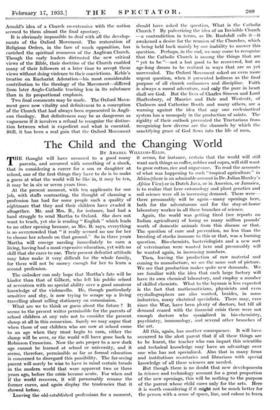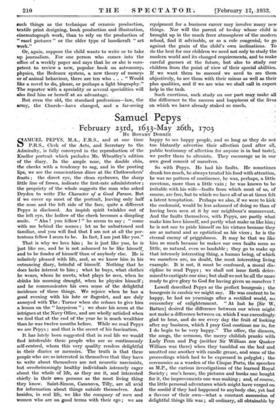The Child and the Changing World
fLuAms-ELtis.
_ parents, and occurred with something of a shock, that in considering a career for a son or daughter at school, one of the first things they have to do is to make a guess at what the world will be like in, it may be ten, it may be in six or seven years time.
At the present moment, with ten applicants for one job, with staffs contracting, the thought of choosing a profession has had for some people such a quality of nightmare that they and their children have evaded it altogether. Mr. and Mrs. B., for instance, had had a hard struggle to send Martha to Oxford. She does not want to teach, yet she ii reading " English " which leads to no other opening because, as Mrs. B. says, everything is so overcrowded that "it really seemed no use for her to choose her schools on that ground." So in three years Martha will emerge needing immediately to cam a living, having had a most expensive education, yet with no skill that she cares to use Their present defeatist attitude may later make it very.l difficult for the whole family, for there will not be money enough for her to learn a second profession.
The Onlooker can only hope that Martha's fate will be kinder than that of Gilbert, who left his public school at seventeen with no special ability save a good amateur knowledge of the violoncello. He, though particularly. sensitive and shy, is now trying to scrape up a living travelling about selling Stationery on commission.
What are we to think or guess about the future ? It seems- to the present writer permissible for the parents of school children at any rate not to consider the present slump at all in this connexion. Surely we may argue that when those of our children who are now at school come to an age when they niust begin to earn, either the slump will be over, or the world will have gone back to Robinson Crusoeism. Now the arts proper to a new dark age cannot be learned at school or university, and it seems, therefore, permissible as far as formal education is concerned to 'disregard this possibility. The far-seeing parent will surely be wise to have in mind certain: trends in the modem world that were apparent two Or three years ago, before the crisis became acute. For when and if the world recovers, if will presumably resume the former curve, and again display the tendencies that it showed before.
Leaving the -old-established professions for a moment,
it seems, for instance, certain that the world will still want such things as coffee, rubber and copra, will still want to grow cotton, rice and sugar cane. To read the accounts of what was happening to such "tropical agriculture" in Africa (there is an admirable account in Dr. Julian Huxley's Africa View) or in Dutch Java, or in America, or Jamaica, is to realize that here entomology and plant genetics and soil science were all in increasing demand. There were— there presumably will be again—many openings here, both for the adventurous and for the stay-at-home laboratory worker in all these branches of science.
Again, the world was getting tired (see reports on Indian agriculture) of losing so many million pounds' worth of "domestic animals from this disease or that. The question of cure and prevention, no less than the breeding of stocks immune to this or that, was a burning question. Bio-chemists, bacteriologists and a new sort of veterinarian were wanted here and presumably will be wanted again, in increasing numbers.
Then, leaving the production of raw material and coming to manufacture, we see the same sort of picture. We see that production makes quite new demands. We are familiar with the idea that each large factory will have its own chemical laboratory, and employ a number of skilled chemists. What to the layman is less expected is the fact that mathematicians, physicists and even crystallographers are also wanted, besides, in some industries, many electrical specialists. There may, ever since the War, have been plenty of doctors, but till all demand ceased with the financial crisis there were not enough doctors who specialized in bio-chemistry, psychiatry, immunology, and several other branches of the art.
All this, again, has another consequence. It will have occurred to the alert parent that if all these things are to be learnt, the teacher who can impart this scientifio and technical knowledge may have an advantage over one-who has not specialized. Also that in many firms and institutions secretaries and librarians with special knowledge of all these sciences are needed.
But though there is no doubt that new developments in ecience and technology account for a great proportion of the new openings, this will be nothing to the purpose of the parent .whose child cares only for the arts. Here it is worth considering if it might not be much better for the person with a sense of space, line, and colour to learn such things as the technique of ceramic production, textile print designing, book production and illustration, cinematograph work, than to rely on the production of "easel pictures" or the older type of handicraft "art work."
Or, again, suppose the child wants to write or to take up journalism. For one person who comes , into the office of a weekly paper and says that he or she is com- petent to review a new, popular book on astronomy, physics, the Bedeaux system, a new theory of moneys or of animal behaviour, there are ten who . . . "Would like a novel to do, please, or perhaps a light biography." The reporter with a speciality or several specialities will also find him or herself at an advantage.
But even the old, the standard professions—law, the army, the Church—have changed, and a far-seeing equipment for a business career may involve many new things. Nor will the parent of to-day whose child is brought up in the much freer atmosphere of the modern school, find it advisable, or as a rule congenial, to go against the grain of the child's own inclinations. To do the best for our children we need not only to study the modern world and its changed requirements, and to make careful guesses at the future, but also to study our children from the point of view of their special abilities. If we want them to succeed we need to see them objectively, to see them with their minus as well as their plus qualities, and if- we are wise we shall call in expert help in the task. - Such exertions, such study on our part may make all the difference to the success and happiness of the lives on which we have already staked so much,







































 Previous page
Previous page